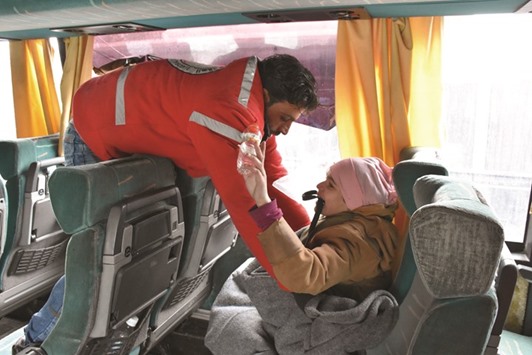A cessation of hostilities across Syria is vital to avoid another deadly battle like the one in Aleppo and get the peace process back on track, the United Nations Special Envoy Staffan de Mistura said yesterday.
At least 35,000 people, both civilians and fighters, have been evacuated from east Aleppo in a week-long operation, the latest UN figures show.
“Many of them have gone to Idlib, which could be in theory the next Aleppo,” de Mistura told journalists in Geneva.
Syrian President Bashar al-Assad said yesterday regaining full control of the northern city of Aleppo was a victory for his Russian and Iranian allies as much as his own country.
Russia, Iran and Turkey said on Wednesday they were ready to help broker a Syrian peace deal, after the three countries held talks in Moscow on Tuesday and adopted a declaration which set out the principles any agreement should adhere to.
De Mistura praised the agreement between Turkey and Russia that paved the way for the evacuation and welcomed the joint initiative by the three regional powers for talks in the Kazakh capital of Astana, ahead of UN peace talks he has convened in Geneva from February 8.
“That is why we have been welcoming the Astana initiative. We will welcome any other initiative in that direction so we can wrap it up as we always hoped with some type of totally inclusive international engagement,” he said.
“The priority remains the cessation of hostilities,” he said.
Meanwhile, Evacuees from Aleppo had expressed concerns about being taken to Idlib and a senior European diplomat said earlier this month that this would suit Russia, as it would put “all their rotten eggs in one basket”.
The last group of civilians and rebels holed up in a small enclave was expected to leave in the next 24 hours, with the Syrian army and its allies seizing all of the city.
More fighters were evacuated overnight from east Aleppo to opposition-held areas under an agreement between the warring sides, the International Committee of the Red Cross said.
“In one of the last stages of the evacuation, more than 4,000 fighters were evacuated in private cars, vans, and pick-ups from eastern Aleppo to western rural Aleppo,” ICRC spokeswoman Krista Armstrong said.
This brought to around 34,000 the total number of people evacuated from the district over the past week in an operation hampered by heavy snow and wind, she said.
“The evacuation will continue for the entire day and night and most probably tomorrow (Friday).Thousands are still expected to be evacuated,” Armstrong said.
“Most are heading towards camps, or to their relatives, or shelter locations,” said Ahmad al-Dbis, a medical aid worker heading a team evacuating patients from Aleppo.”The humanitarian situation in northern Syria is very difficult, because the area is already densely populated since it has people displaced from all over Syria.”
Those leaving Aleppo are not only going to Idlib, the name of a city and province southwest of Aleppo, but to villages in the countryside in Aleppo province that lies west and north of the city and has also been heavily bombed.
Ahmed Kara Ali, spokesman for Ahrar al Sham, a rebel group that is involved in departure negotiations, told Reuters “large numbers” were left but it was difficult to estimate how many remained, beyond it being in the thousands.
Hundreds of other people are also still being evacuated from two villages besieged by rebels near Idlib and taken to government lines in Aleppo, part of the deal that has allowed insurgents to withdraw from the city carrying light weapons.
Another rebel official said a heavy snow storm that hit northern Syria and the sheer numbers of civilians still remaining were among the factors behind the delay in the mass evacuation.
“The numbers of civilians, their cars alongside and of course the weather all are making the evacuation slow,” Munir al-Sayal, head of the political wing of Ahrar al Sham, said, adding he expected the operation to be completed yesterday.
The tiny pocket they are fleeing is all that remains of a rebel sector that covered nearly half the city before being besieged in the summer, the cue for intense air strikes that reduced swathes of it to rubble.
As the months of bombardment wore on, rescue and health services collapsed.
The once-flourishing economic centre with its renowned ancient sites has been devastated during the war which has killed more than 300,000 people, created the world’s worst refugee crisis and allowed for the rise of Islamic State.
29 killed in Turkish strikes on IS bastion
At least 29 civilians including eight children were killed yesterday in Turkish air strikes on an Islamic State group bastion in northern Syria, a monitoring group said.
The Syrian Observatory for Human Rights said the strikes were carried out on the flashpoint town of Al-Bab, which Turkish forces have been seeking to capture for weeks in the biggest test of a four-month incursion into Syria.
The raids came a day after 14 Turkish soldiers were killed by jihadists around Al-Bab, in the country’s biggest loss of the campaign so far. Turkish troops entered Syria on August 24 in support of pro-Ankara Syrian rebels, with the aim of ousting IS jihadists as well as Kurdish militia. Prime Minister Binali Yildirim vowed yesterday to press on with the fight, saying: “Turkey is in the midst of a great struggle – our fight against terror continues both in our country and outside our borders.”

A Syrian child, who was evacuated from the villages of Fuaa and Kafraya and who is in poor health condition, is loaded into a bus by members of the Syrian Arab Red Crescent before heading to Homs in order to receive medical care yesterday at a makeshift shelter in Jibrin on the eastern outskirts of Aleppo.
